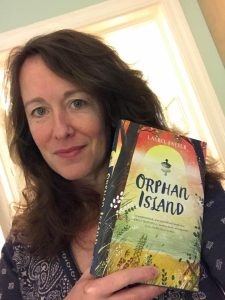by Kitty Felde
I started out as an actor. For ten years, I’d drive the freeways of Los Angeles for auditions for commercials and sitcoms, spending my evenings onstage in tiny theatres all over town. When I hit my 30’s, the jobs for women started drying up and I put my heart into the writing.
Now, decades later, I’m back on stage – again, driving all over town to perform on small stages, this time in Washington, DC instead of Los Angeles. It’s great fun. But I’m finding I’m learning more about the writing from the other side of the footlights.
As playwrights, nothing helps like hearing our words out loud – whether it’s a group of friends, happy with many bottles of wine and beer, who read a new draft in the living room; or onstage, standing behind music stands, before a small audience for a staged reading. Hearing those words spoken out loud is a completely different experience than staring at them on a laptop screen.
But now that I’m memorizing someone else’s lines, standing on stage, exposing my inner actor to the world, I’m finding new lessons in playwriting. I’m in a new play by a fine writer, D.W. Gregory called “Salvation Road” – the tale of a college kid trying to rescue his sister from a cult. I play the hip Catholic nun Sister Jean – part mentor, part nudge, battling her bishop and “that vow of obedience thing.”
Here’s what I’m learning about playwriting from the experience:
1 – Specific lines that are hard to memorize are usually because the actor can’t find a connection between what happens directly before the line and what happens after.
I watch this happen in rehearsal over and over again. There’s always one line that every actor stumbles over every time. Why? The logic of the lines is clear to the writer, but not to the actor.
Note to my playwright self: watch for these lines, rewrite to make the connections clear. Actors aren’t sitting with you at the computer, following your logic.
2 – Watch out for repetition.
My Skype playwriting pal Ellen Struve always says we writers say things three times – just in case the audience isn’t listening. True.
In rehearsal, there are certain words or phrases that are used repeatedly – toxic and hypocrite come to mind. They are perfectly fine words for a playwright to use – strong and clear words. But an actor’s brain scrambles them and the lines are often transposed from one scene to the next.
Note to my playwright self: look at repetition, but don’t let lazy actors be the reason you change them if that’s the word you need.
And yes, an audience sometimes does need to hear something three times.
3 – Actors hate stage directions. And punctuation. Especially punctuation.
I know as a writer, I want my lines to be performed the way that I hear them in my head. How do you communicate that to an actor? Sentence structure and punctuation can help.
As an actor, this is driving me crazy! My phrasing of a thought doesn’t want to come to a halt at the period in a particular sentence. I want to let this character speak the way she wants to speak! But I’m an actor, not a writer and it’s my job to bring the script to life the way the writer wants it. Sigh.
Note to my playwriting self: Trust your actors to bring meaning to your words.
4 – Acting is more difficult than writing.
I don’t really believe this. Writing, staring at that blank screen, battling all the demons that scream at you inside your head that you have no talent, nothing to say, and your play will never get produced anyway – that’s hard. Coming up with believable characters and scenes and a satisfying ending? That’s even harder.
But acting is hard work, too. I forgot how difficult memorization can be! And standing up in front of an audience is nerve wracking! I had my first Equity audition in decades and went up on my lines! I hadn’t been that nervous in forever. And there’s that baring one’s soul business. It’s easier to do it while typing than saying it out loud.
Note to playwriting self: when the writing is tough, remind yourself that nobody’s watching you fail in real time. It’s just you and the machine. The audience – and the critics – are a million miles away.
5 – It’s still all about that time in the rehearsal room.
It’s always been my favorite part of theatre. Yes, I love the opening night applause, overhearing the chatter at intermission, getting flowers when my husband remembers to get them. But the real joy in theatre – both as an actor AND as a playwright – is the work in that rehearsal room. “An effemeral art” as Cash Peters described it – here today and gone at the end of the evening. But what magic happens in that room! That’s the joy of the theatre.
Note to playwriting self: find more opportunities to BE in that rehearsal room. Get back in the regular habit of sending out plays. Self-produce. Find other writers who need a reading. Volunteer to read for them.
Note to acting self: see above.
“Salvation Road” opens Saturday, July 11 at the Capitol Fringe Festival in Washington, DC.
Like this:
Like Loading...






